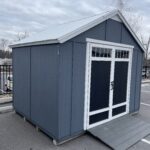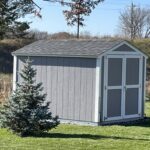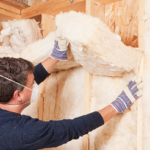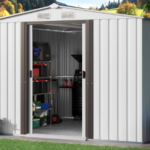Some will say you should not seal a garage or shed floor because you are just wasting money. Others will tell you that if you apply a sealer to the floor surface, you will increase the chances that the floor will be slippery or that you will fall.
Many builders say that you don’t need to seal a new floor. Rather, wait until it has some age, wear and tear, and stains, and then begin the sealing drill.
However, based on my experience, I recommend that you should always seal a garage or shed floor — and it doesn’t cost a fortune. The benefits far outweigh any possible downsides or expenses; it will even save you money in the long run. Here’s why, plus some tips for sealing your floors.
Why Should You Seal a Garage or Shed Floor?

There are many benefits to sealing a garage or shed floor. Often, people believe that since the floors are concrete and not exposed directly to the weather, it’s okay to skip the sealant. But if you want to make it last longer, look better, and keep it easy to maintain and clean, you can’t skip this step.
Sealing a floor can also help combat some simple moisture issues, but if you have recurring issues with your garage floor sweating, then you should also take other steps.
Sealer Protects the Concrete
Sealing the concrete stops moisture from coming from beneath the floor; if moisture was able to get in, the components that make up concrete would be weakened or altered. Sealer also prevents any spilled water or the elements from penetrating the pores of the floor.
I have not done controlled experiments on this, but I believe that sealing a new concrete floor will keep it in very good or excellent condition 2-3 times as long as not using any sealant.
Stain Resistant
Your garage and shed floors are exposed to many staining agents. Oil from vehicles and lawnmowers would be only one example! If you have raw concrete with no sealer on it, the oil will seep into the pores of the concrete and become a permanent stain on the floor. While most homeowners probably don’t expect their garage to always look pristine, unsightly stains aren’t a great look.
Increases Home Value

When you go to sell your home, a garage or shed floor that is stain-free, odor free, and sealed so it can be cleaned easily will increase the home’s value. Future buyers want to see clean surfaces and will pay a little more for a home where these floors have been sealed. .
Sealers Can Block Old Odors
Through the years, the raw surface of the garage and shed floors is often exposed to odor-causing situations. From spilled oils to pet accidents, odors can build (and intensify). But sealers keep those odors out.
On the pet point, if you plan on pets using your shed or garage, you will not want to skimp on your sealant. In my experience, pet odors — specifically from urine stains — are among the most difficult to deal with. I have been in sheds and garage that, years and years after the pets are gone, still have that smell. If your structure will be home to pets, consider having the high-end sealant applied professionally.
They Make the Floors Easier to Clean
Have you ever tried to sweep a concrete floor that hasn’t been sealed? It’s challenging! Partly because, every time you sweep that broom, you’re rubbing off small amounts of concrete, too. You’re literally creating dust by cleaning!
Sealing the floor, though, makes it easier to mop, sweep, and clean up any oil spills or pet accidents.
It Makes the Floor Last Longer

Over time, garage and shed floors can experiencing cracking and chipping. Sealers keep your floors looking amazing. And even if there was a small crack before you applied the sealant, it will make the difference as it will ensure the gap doesn’t become worse over time (and may even make it smaller!).
For colored concrete, a sealer also will protect the color and keep it from fading or becoming dull. Your floor will stay looking great. And, as an added bonus, for older concrete floors that have become rough, even with prior sealant, adding a new layer will smooth out the surface again.
Sealing Products to Consider
There are a lot of great products designed to be used to seal concrete floors. There are four main types of sealants that people rely on.
Epoxy Paints

Epoxy paints, such as Quikrete and Rust-Oleum Epoxy Shield, are one of the most frequently chosen sealants. It is a mixture that combines a strong bonding agent (glue) and paints to create a substance that bonds with the cement. That means epoxy paint lasts longer when applied to concrete than ordinary floor paint without the bonding agent would.
Urethane Cement Coatings
Urethane cement coatings, including Spartacote and Rust-Oleum Rocksolid, are frequently chosen because they last a long time and are easy to install. When you use this type of sealer, you can expect a finish that resists chemicals and has a very attractive high gloss.
However, epoxy coatings are often chosen before urethane products because epoxy tends to bond better and they’re easier to maintain.
Acrylic and Latex Coatings
Acrylic and Latex coatings sealers tend to be less expensive. Two common brands are Olympic Waterguard and Zep. However, with lower costs comes less durability and less protection. You also run the risk of chemicals dissolving or removing the sealant. The only way to get the complete protection you want and use acrylic is to get an acrylic that has epoxy blended in, like the Kilz acrylic/epoxy garage floor paint.
durability and less protection. You also run the risk of chemicals dissolving or removing the sealant. The only way to get the complete protection you want and use acrylic is to get an acrylic that has epoxy blended in, like the Kilz acrylic/epoxy garage floor paint.
Drylok is another very good floor latex, easy to apply, and can be mixed with grit to give it traction.
Polyurea
This is the best garage floor sealer. It has the strength of epoxy paint, but while epoxy will only last a few years, Polyurea will last decades. These coatings, such as Minwax Polyurethane for Floors or Varathane Floor Finish, offer the best protection against stains, water penetration, thermal shock, odor blocking, and protection from impacts. Polyurea products can also be put on in layers, increasing the durability and protection. They also provide the most aesthetic value creating a beautiful finish that is easy to clean and maintain.
Tips on Sealing

Here are some tips to make your concrete sealant stick and last a long time!
- You can broadcast sand or a non-slip additive that has the consistency of sand on top of the wet floor to make the finished product less slippery. You can also mix a grit in with the paint or sealer as you are preparing to apply it, which will give the floor more traction.
- You need to watch your outdoor temperature and apply a sealer when the temperature is going to be 50 degrees Fahrenheit or higher. This will allow the sealer to dry quicker.
- You want to avoid applying sealer on a rainy day or a day with extremely high humidity levels.
- You can apply epoxy paint over a urethane sealer and polyurea products over almost all paints. The polyurethane product will give your floor gloss.
When it comes to concrete floors, whether they are in your shed, garage, or basement, if you spend a few extra dollars and take the time to seal the surface, the floor lasts longer, looks better, and is easier to maintain!
Garage and Shed Floor Sealing FAQs
Do I need to prepare the garage floor before applying the sealer?
Yes, it’s important to properly prepare the garage floor before applying any type of sealer. You will need to clean the surface thoroughly to remove any dirt, oil, or other contaminants, as well as repairing any cracks or damage to the concrete. Depending on the type of sealer you’re using, you may also need to etch or sand the surface to ensure proper adhesion. If you do not start with a perfectly clean garage or shed floor, the sealant job will not be as good and will not last as long.
How long does it take to seal a garage floor?
The time it takes to seal a garage floor will depend on several factors, including the size of the space, the type of sealer you’re using, and the condition of the concrete. In general, the process can take anywhere from one to three days, including preparation, application, and drying time. Don’t skimp on the preparation – begin with a clean floor!

Can I seal a garage floor myself, or should I hire a professional?
Sealing a garage floor is a task that can be done by a DIYer with some experience and the right tools. However, if you’re not comfortable working with chemicals or have never done this type of project before, it may be best to hire a professional to ensure the job is done properly. The sealant can have a very strong fume, so if fumes tend to bother your lungs or eyes, consider hiring someone who has the right safety equipment.
How often do I need to reseal my garage floor?
The frequency of resealing a garage floor will depend on the type of sealer you’re using and the amount of traffic the space receives. In general, most sealers will last for several years before needing to be reapplied, but it’s important to monitor the condition of the surface and reseal as needed to maintain its appearance and protection. I probably sound like a broken record, but












